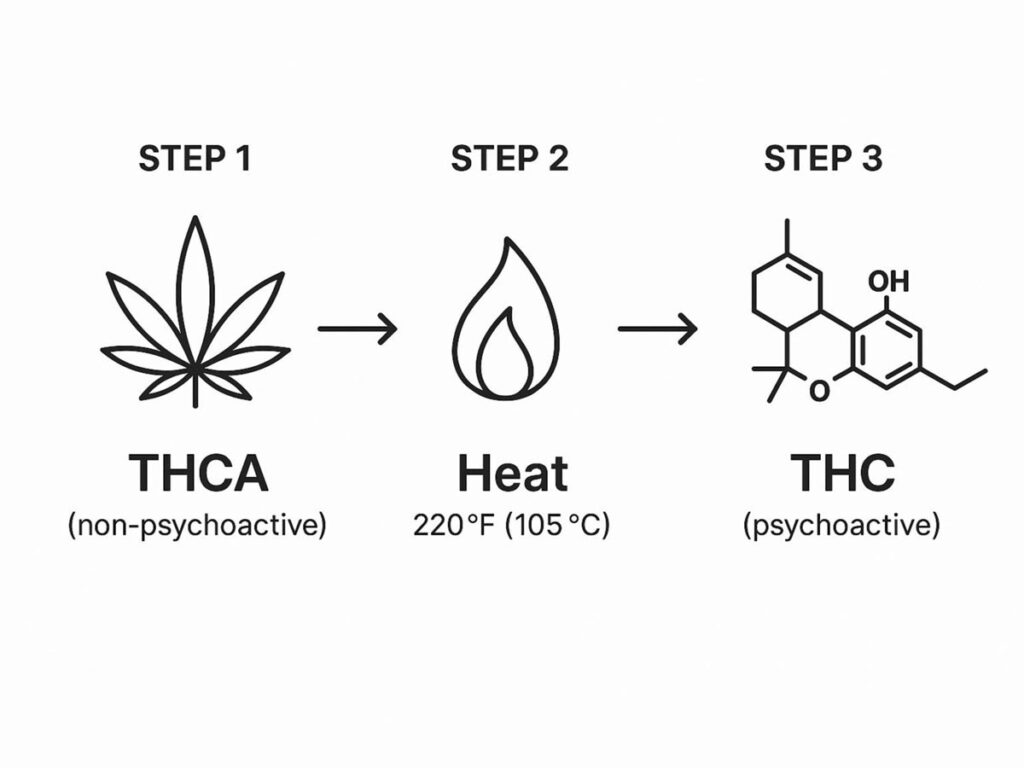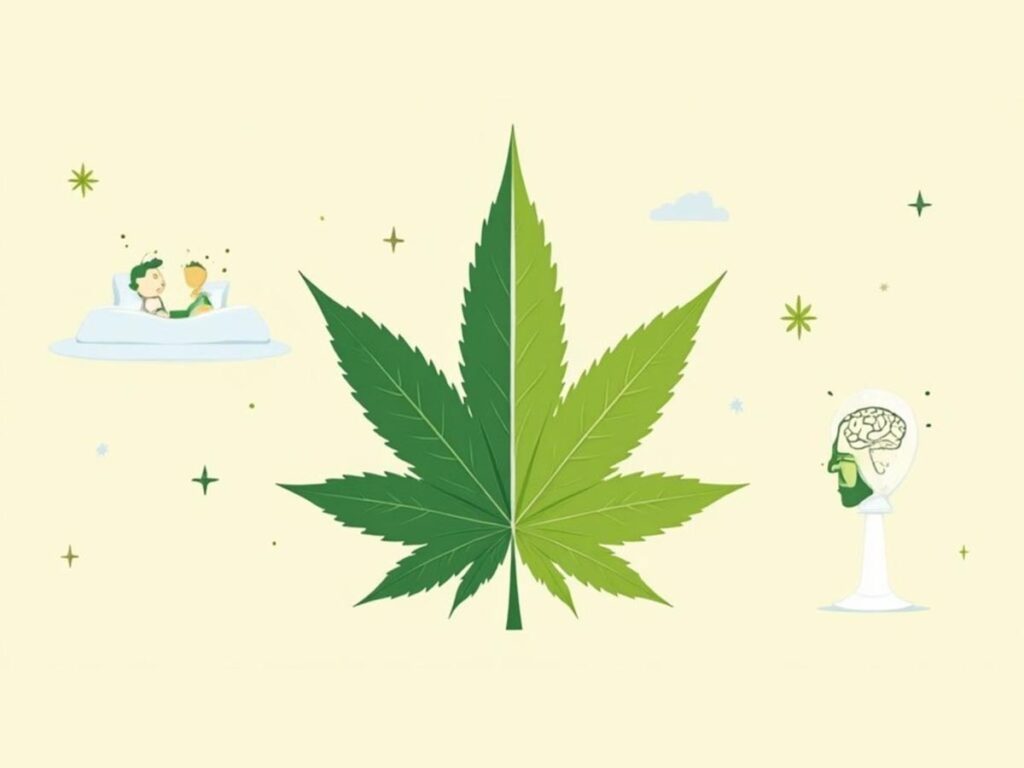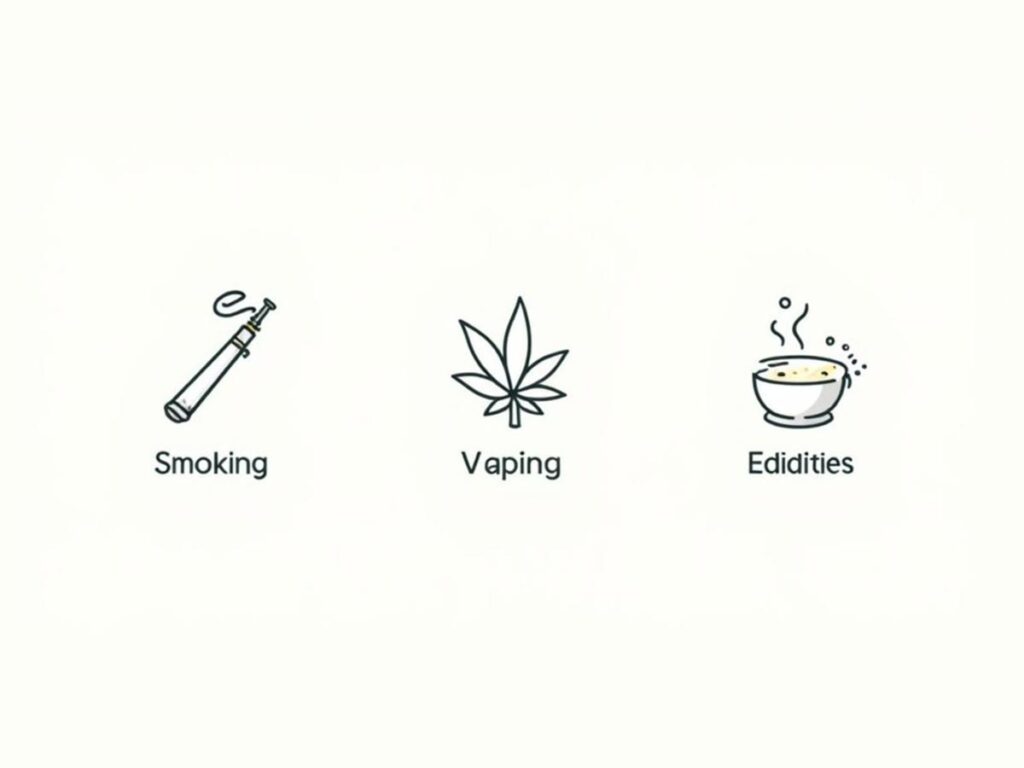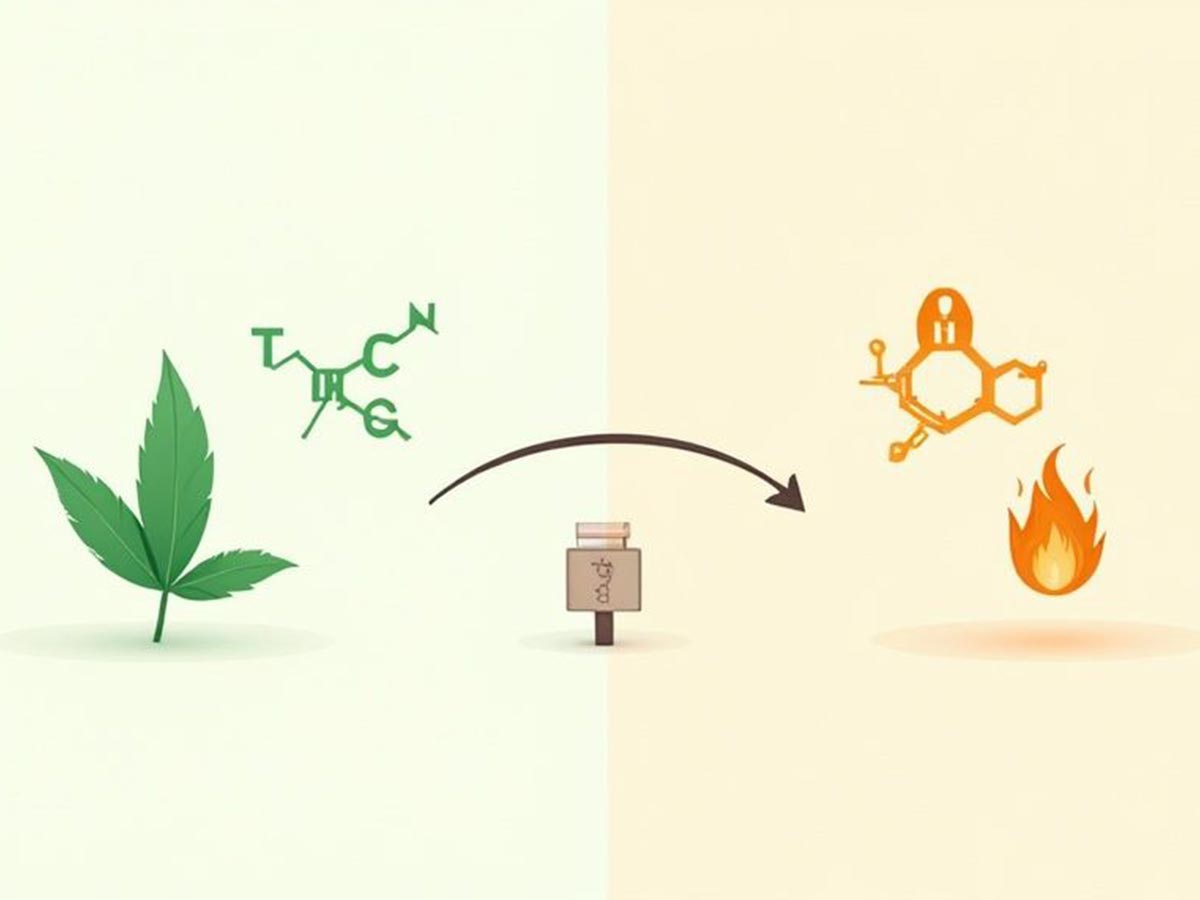When you’re trying to understand THCA vs. THC, it boils down to one simple factor: heat. Think of THCA as the raw, untapped potential found in fresh cannabis plants—it won’t get you high. THC is what THCA becomes when you apply heat, and it’s the famous molecule that delivers the classic cannabis ‘high.’
That’s the core of it. The entire transformation from a non-psychoactive compound to a psychoactive one is unlocked by a little heat.
Unpacking The Core Differences
On a chemical level, THCA (Tetrahydrocannabinolic Acid) and THC (Tetrahydrocannabinol) are nearly identical twins. The key difference is that THCA has an extra “carboxyl” group attached to it. This small addition completely changes how the molecule interacts with your body, preventing it from producing a high.
When you apply heat—through smoking, vaping, or cooking—that extra group breaks off. This process, called decarboxylation, transforms THCA into THC, activating its psychoactive properties.
Practical Example: If you were to juice raw cannabis leaves and drink it, you’d be consuming THCA. You might experience some of its wellness benefits, but you wouldn’t feel intoxicated. However, if you bake those same leaves into brownies, the oven’s heat converts the THCA to THC, and the final product will be psychoactive.
This conversion is a fundamental concept in cannabis science. Research published in Nature Portfolio shows this process can even happen slowly over time. In one study, fresh cannabis contained 6.5% THCA, but after simple air-drying, that number dropped to 4.8% as some of it naturally converted.
Actionable Insight: To experience the psychoactive effects of cannabis, you must heat it first. Without heat, the THCA remains in its non-intoxicating state.
Let’s break down their main attributes side-by-side for a clearer picture.
Key Differences Between THCA and THC
This table gives you a quick, at-a-glance comparison, helping you understand their distinct properties and uses.
| Characteristic | THCA (Tetrahydrocannabinolic Acid) | THC (Tetrahydrocannabinol) |
|---|---|---|
| Psychoactivity | Non-psychoactive (does not produce a ‘high’) | Psychoactive (produces the classic ‘high’) |
| Found In | Raw, unheated cannabis plants | Heated or aged cannabis material |
| Activation | Requires heat (decarboxylation) to become THC | Already active; no heat required for its effect |
| Primary Use Case | Wellness support without intoxication | Recreational enjoyment and therapeutic relief |
As you can see, they originate from the same plant but are worlds apart in their effects and applications. It all comes down to whether that crucial heat-activated conversion has taken place.
The Chemical Journey from Raw Plant to Active Compound
To truly grasp the THCA vs. THC distinction, let’s look at the science in a simple way. The entire transformation from the raw, non-intoxicating THCA to the celebrated THC hinges on one critical process: decarboxylation.
Picture the THCA molecule wearing a small backpack—that’s the carboxyl group. This little backpack changes the molecule’s overall shape, making it too bulky to fit into the brain’s CB1 receptors, which are the docking stations responsible for creating the “high.”
This diagram illustrates how applying heat forces the THCA molecule to drop its carboxyl group (COOH), changing its structure into THC.

Heat is the catalyst that physically reshapes the compound, unlocking its psychoactive potential. This is precisely why eating raw cannabis flower won’t get you high, but smoking or vaping it delivers immediate effects.
How Heat Unlocks THC
Decarboxylation is the scientific term for what happens when you add heat. The ideal temperature for this conversion is around 220°F (105°C). At this point, the carboxyl group breaks away as carbon dioxide, leaving behind the activated THC molecule.
Here’s how this happens in practice:
- Smoking: The flame from a lighter provides instant, intense heat, converting THCA to THC on the spot.
- Vaping: Vaporizers are engineered to heat cannabis to the perfect temperature for conversion, releasing cannabinoids without combustion.
- Baking: When making edibles, you first bake the cannabis to “decarb” it. This activates the THC before it’s infused into butter or oil.
Actionable Insight: THCA is raw potential. Without heat, it remains non-intoxicating. Add heat, and you transform it into the compound known for its signature effects.
This fundamental process isn’t just for flower; it’s essential for creating powerful products like wax and shatter. To see how this applies to different product types, check out our cannabis concentrates guide, which explains how extraction and heat create such potent results.
Comparing How THCA and THC Actually Make You Feel
Chemistry aside, the practical difference between THCA and THC comes down to a simple question: what experience are you looking for? Your answer will guide you to one compound or the other.
THC is the star of the show, famous for its psychoactive effects. It’s the compound that can produce feelings of euphoria, deep relaxation, altered sensory perception, and increased appetite. Its molecular structure is the perfect key to unlock the brain’s CB1 receptors, triggering those classic sensations.
On the other hand, raw THCA does not produce a ‘high’. Its shape is just different enough that it can’t connect with those same receptors, a crucial distinction that opens up entirely different uses.
The THCA Experience: Wellness Without the High
Since it won’t get you high, THCA has become a go-to for people seeking potential wellness benefits without the buzz. It’s being integrated into daily routines for support without any psychoactive side effects.
Practical Example: Someone might add raw cannabis leaves or a THCA tincture to their morning smoothie. They are aiming for potential anti-inflammatory or neuroprotective properties to support their wellness goals without impacting their ability to work, drive, or focus. It’s all about function, not intoxication.
The core difference in feeling lies in how well each molecule binds to your cannabinoid receptors. THC’s shape is a perfect fit, which is why its effects are so much more powerful and noticeable.
Scientific studies confirm this. Research has shown that THC binds to the CB1 receptor 62 times more effectively and to the CB2 receptor 125 times more effectively than THCA. This massive gap in binding affinity is exactly why one compound is psychoactive and the other is not.
The THC Experience: From Recreation to Relief
Once you apply heat, the game changes. Smoking high-THCA flower, dabbing concentrates, or using a vape pen instantly converts THCA into THC. This is the path most people choose for recreational enjoyment or for powerful relief from conditions like chronic pain or anxiety.
Many consumers explore what dab wax is to understand how these concentrated forms deliver potent, fast-acting effects. In this case, you are intentionally choosing the activated form of the cannabinoid for the psychoactive and physical sensations it provides.
Navigating the Tricky Legal Landscape
When it comes to THCA and THC, understanding the law is crucial. The legal framework largely stems from the 2018 Farm Bill, a federal law that legalized hemp products containing less than 0.3% Delta-9 THC by dry weight.
This bill inadvertently created a legal gray area for THCA. Since raw THCA isn’t Delta-9 THC, products like high-THCA flower are sometimes sold as federally compliant hemp, especially in states without legal recreational cannabis. However, the legal landscape is more complicated than that.
The Problem with “Total THC” Laws
Many states have closed this loophole by enacting “total THC” laws. These regulations consider the potential THC in a product by calculating what the final THC content would be after heating.
The formula typically used is: Total THC = Delta-9 THC + (THCA × 0.877). If this calculated value exceeds the 0.3% threshold, the product is classified as illegal marijuana, regardless of its initial Delta-9 THC level. This has resulted in a complex patchwork of laws that vary from state to state.
Actionable Insight: Always verify your local and state cannabis laws before making a purchase. Regulations are frequently updated, and what’s legal in one place may be illegal just across the state line.
The USDA’s official guidance on hemp production provides the federal foundation, but states have the final authority on how these products are regulated.

Before you buy, protect yourself by always checking for a Certificate of Analysis (COA). This third-party lab report details the exact cannabinoid percentages, allowing you to confirm the Delta-9 THC and total THC levels yourself. It’s the best way to ensure you’re making a safe, informed, and legal decision.
Which Cannabinoid Is Right for Your Goals
Now for the most important part: how do you choose between THCA and THC? The answer comes down to your personal goals. Your desired outcome is the best compass for navigating your options and finding the perfect product.
Let’s walk through a few common scenarios.
Choose THCA for Non-Psychoactive Wellness
Are you curious about cannabis for its potential therapeutic benefits but want to maintain a clear head? If your goal is to support your body’s wellness without any intoxication, then raw THCA is your ideal choice.
The key is to use products where the THCA remains unheated.
- THCA Tinctures or Juices: Add a few drops to a cold drink for easy consumption.
- Raw Cannabis Powders: Blend into a smoothie or sprinkle over a salad.
- Topicals: Apply THCA-infused balms directly to the skin for targeted relief without a head high.
Choose THC for a Psychoactive Experience
If you’re seeking the classic euphoric and relaxing effects associated with cannabis, then THC is what you’re looking for. This is the compound used for recreational enjoyment, creative pursuits, deep relaxation, or therapeutic goals like managing pain and stimulating appetite.
To get THC, you need a product that has been heated or one that you heat upon consumption. For those seeking a powerful and flavorful experience, options like the best THCA hash rosin carts are an excellent choice, as they deliver potent, clean THC vapor with every draw.
The Bottom Line: For non-intoxicating wellness, stick with raw THCA. For psychoactive effects or more intense therapeutic relief, you need a product that delivers THC through heat.
It’s worth noting that the natural ratio of THCA to THC can vary dramatically from plant to plant. Research has shown that this ratio can range from 0.5:1 to over 6:1. This highlights how important cultivation and genetics are in creating products tailored for specific effects—a science that growers and producers have been perfecting for decades.
This simple guide can help you match your goals to the right cannabinoid.
Choosing Between THCA and THC for Your Needs
Use this table to confidently select the right cannabinoid and product based on your wellness or recreational goals.
| Your Goal | Recommended Cannabinoid | Common Product Types | Key Consideration |
|---|---|---|---|
| Daily Wellness Support (Non-Psychoactive) | THCA | Raw tinctures, powders, fresh juices, topicals | Keep the product away from heat to preserve the raw THCA. |
| Recreational Use & Euphoria | THC | Smokable flower, vapes, edibles, dabs | Heat is required for conversion. Start with a low dose to find your comfort level. |
| Potent Pain or Symptom Relief | THC | Edibles, high-potency vapes, tinctures, RSO | Be prepared for the psychoactive effects, which are integral to the experience. |
| Localized Physical Discomfort | THCA | Topicals (creams, balms, salves) | Apply directly to the target area for non-intoxicating, localized relief. |
Ultimately, defining what you want from your cannabis experience is the first and most important step in choosing between these two fascinating compounds.
Frequently Asked Questions About THCA and THC
To round out your knowledge, let’s answer the most common questions people ask when navigating the differences between THCA and THC. Here are the quick, clear answers you need to move forward with confidence.

Will Consuming THCA Make Me Fail a Drug Test?
Yes, it is highly likely you will fail a drug test. Most standard drug screenings are not sophisticated enough to distinguish between THCA and THC. They test for THC metabolites, which your body produces after processing THC.
Even if a product is labeled “pure THCA,” it almost always contains trace amounts of THC. Furthermore, some of the THCA you consume can convert to THC in your body. To be safe, it’s best to avoid all THCA and THC products if you expect to be tested.
Is THCA as Strong as THC?
This is a smart question with a two-part answer. In its raw, unheated form, THCA has zero psychoactive “strength”—it will not get you high.
However, high-THCA cannabis flower or concentrates become incredibly potent the moment you heat them. When smoked or vaped, all that THCA converts into a powerful dose of THC. So, while THCA itself isn’t strong, its potential to become strong THC is very high. The strength you feel depends entirely on whether the conversion to THC has occurred.
Can You Cook with Raw THCA Flower?
Absolutely. Cooking with THCA flower is the foundational step for making homemade edibles. The heat from your oven or stove is precisely what triggers decarboxylation, converting the non-psychoactive THCA into the psychoactive THC that infuses your food.
Practical Example: When you bake cannabis into brownies or simmer it in butter, you are intentionally using heat to transform the raw THCA into the potent THC needed to create an effective edible.
What Is the Main Benefit of Using THCA Over THC?
The primary advantage of using raw THCA is the ability to access the potential wellness benefits of the cannabis plant without experiencing a high.
This makes it an excellent option for individuals who want to explore potential anti-inflammatory or neuroprotective properties while needing to remain clear-headed and fully functional. You can incorporate it into your daily wellness routine without it interfering with work, driving, or other responsibilities.
Ready to find high-quality cannabis products that align with your goals? Wallflower Cannabis House in Las Vegas offers a curated selection of premium flower, edibles, and concentrates. Visit us online or in-store to let our expert team help you discover your perfect match.

